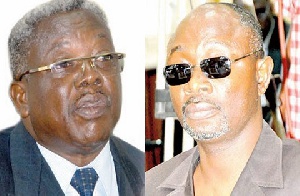The Court of Appeal sitting in Accra yesterday, set aside the findings of the judgement debt Sole Commissioner appointed by former President John Mahama, Justice Yaw Apau, against embattled businessman, Alfred Agbesi Woyome.
It had stated that Woyome was fraudulently paid the judgment debt without inviting him to defend himself.
According to the Appeals Court, Justice Apau, former judge of the court, who was promoted to the Supreme Court after the judgement debt assignment, breached the rule of natural justice when he made adverse findings against the NDC bankroller without inviting him to present his side of the story.
The court also ordered Justice Apau to expunge from the White Paper dated November 18, 2015 and the report of the sole commissioner the findings and decision pertaining to Woyome.
The court however, maintained that the order by the Supreme Court that all monies paid to Woyome and other companies involved in the stadia contract be refunded to the state, stands forever.
However, despite all the tactics employed by Woyome to delay the refund of the money he fraudulently received as judgment debt, he is undergoing oral examination by Deputy Attorney General, Godfred Yeboah Dame, in a bid to retrieve the money
This follows an order by the apex court for the NDC financier to submit himself for the oral examination after it had dismissed an appeal filed by his lawyer to halt the exercise.
A panel of three judges, presided over by Justice Victor Ofoe, with Justices S. Dzamefe and M.M. Agyemang assisting, held that the sole commissioner based his findings on the documents which Woyome was using in court to prove that he did not fraudulently receive the money from the state.
It is therefore, the opinion of the court that the sole commissioner ”after examining the documents, was convinced that the appellant (Woyome) was not entitled to the amount claimed and paid to him and the payment was fraudulent, the appellant (Woyome) should have been invited and confronted with the documents that formed the commissioner’s conviction of fraud and deceit, particularly when other documents were used which did not come from the appellant (Woyome)”.
It is the opinion of the court that the commission relied on a report by the Economic and Organised Crime Office (EOCO) which by statute, was an investigation report.
It said Woyome had the right to know what the EOCO report was about and offer his explanation to it, bearing in mind that the EOCO report “was not a final report but subject to scrutiny of the courts at any appropriate time.”
General News of Friday, 9 March 2018
Source: dailyguideafrica.com

















